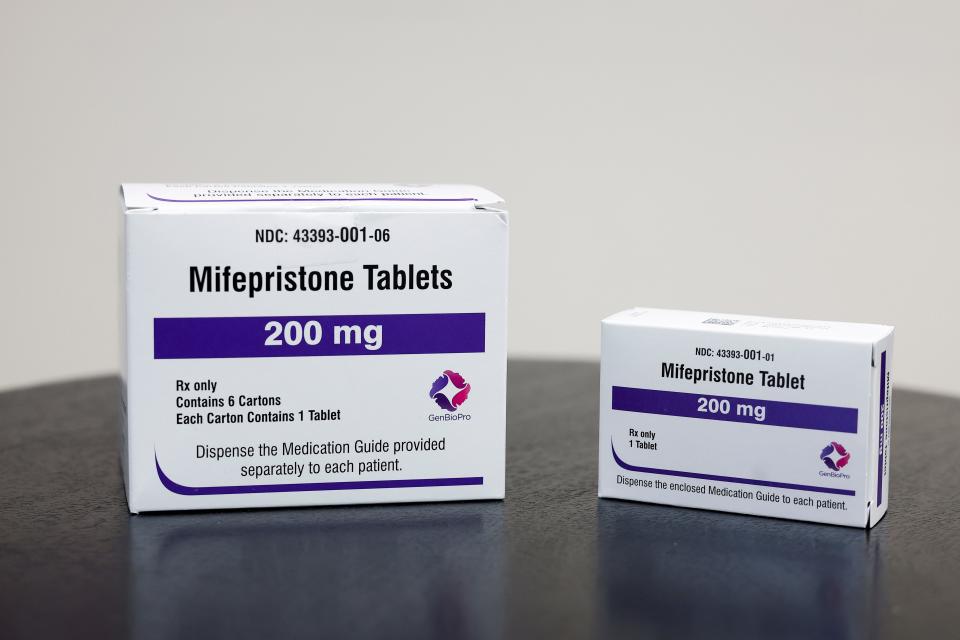Walgreens will now dispense the abortion pill in Pa. What's behind the change?
Walgreens pharmacies this month are starting to carry an abortion pill for patients in Pennsylvania, one of a handful of states where the pharmacy chain will begin dispensing the drug.
Though medication abortions account for more than half of pregnancy terminations in Pennsylvania, patients up to this point have had limited access to the drug, mifepristone, in pharmacies, instead generally having to pick it up from a medical provider or order it by mail.
But Walgreens recently announced that the U.S. Food and Drug Administration has approved its certification to dispense the abortion pill and that it would provide it at select locations in Pennsylvania, New York, Massachusetts, California and Illinois this month.
“It really underscores how safe and effective mifepristone is,” Melissa Reed, CEO and president of Planned Parenthood Keystone, said in an interview. "This is fantastic, that Walgreens is going to make this prescription more accessible."

Reed said she’s not sure why Walgreens chose Pennsylvania for its new program, but she suspects the commonwealth’s abortion protections and embrace of telemedicine factored into the decision.
CVS also landed FDA approval to dispense the abortion pills and indicated it would begin providing mifepristone at all of its pharmacies in Massachusetts and Rhode Island.
The expansion comes on the heels of a federal regulatory decision last year that retail pharmacies could supply the medication with a prescription.
Which Walgreens locations will offer the medication?
The medication won’t be available at all Walgreens locations — just a select few at first, the company has explained. To protect the safety of patients and pharmacy staff, the company is withholding the locations that will dispense mifepristone.
The pharmacy chain gave physicians instructions for identifying the locations that are part of the initial rollout, but if a prescription goes to the wrong store, Walgreens staff can also redirect it to an appropriate pharmacy.
Walgreens has said they started with a handful of locations at first to “ensure quality, safety and privacy for our patients, providers and team members." However, over time, they hope to expand to all stores in states where it’s legally allowed.
More: A new Pa. Supreme Court ruling could change abortion access in the state. Here's how.
What impact will this have?
Mifepristone is one of two drugs typically used during medication abortion and blocks a hormone needed for a pregnancy to continue developing. It's approved for terminating pregnancies up to roughly 10 weeks of gestation. Misoprostol, the second medication in the regimen, causes the uterus to begin contracting and expel the fetal tissue.
Misoprostol has long been available at pharmacies, Reed said, but until recently patients have only been able to access mifepristone at doctor’s offices or through the mail.
Making the medication available at pharmacies will enable patients to get it without visiting a physician’s office or waiting for mail delivery, Reed said.
Instead, a patient could meet with a physician via a telehealth appointment, complete some required blood work at a local lab and then pick up the mifepristone at a nearby pharmacy, she added.
“This will be a lot more convenient for patients,” she said.
However, she emphasized that the medication is not available over-the-counter and that people seeking an abortion will still have to get a prescription through a telemedicine or in-person appointment with a physician.
What about the court case on mifepristone?
Even as pharmacies are expanding access to mifepristone, the U.S. Supreme Court later this month is scheduled to hear a case brought by plaintiffs who want tighter restrictions on the drug.
A conservative group is urging the high court to undo recent FDA actions allowing patients to obtain mifepristone by mail and authorized pharmacies to dispense it. The plaintiffs contend that federal regulators have sanctioned the pill’s use and distribution without sufficiently examining its potential health risks.
However, the federal agency maintains that the drug has a track record of safe use stretching back decades, and the American College of Obstetricians and Gynecologists noted that fewer than 1% of patients experience serious side effects.
“The risk of death is almost non-existent,” the college wrote in a legal brief last year, adding that it’s riskier to take Viagra or undergo a wisdom tooth removal.
The Supreme Court hearing is scheduled for March 26.
Even if the Supreme Court were to curtail access to mifepristone, Planned Parenthood providers could continue to offer medication-induced abortions by prescribing misoprostol on its own, Reed said.
This article originally appeared on Beaver County Times: Where can Pennsylvanians go to access the abortion pill?

